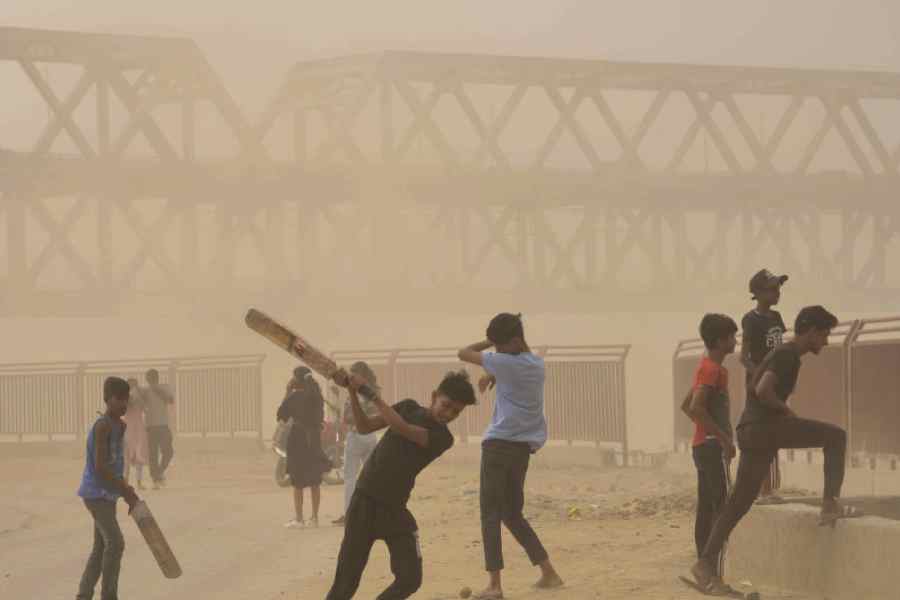All in the game
Sir — As children, heated disputes on the playground had seemed nothing short of calamitous. Think of a game of gully cricket; it would have been incomplete without arguments about whether or not a ball had been hit for six or even bickering over whose turn it was to bat. Such fights, though, have now become cherished memories. But with open spaces shrinking and children rarely playing outdoor games, one could be forgiven for thinking that these arguments are a thing of the past. Clearly not. Recently, a 20-year-old man from New Jersey travelled to Florida to attack a fellow gamer. Games might have shifted online, but the passion for them endures. In fact, thanks to the internet, gaming rivalries have shifted out of the mohallas and gone global.
Dhammanand Sawant, Mumbai
Poorly maintained
Sir — The national capital received 148.5 millimetre of rain in just 3-4 hours last Friday. This led the roof of one of the terminals at the Delhi airport to collapse (“Delhi airport roof crash”, June 29). Unfortunately, it started a political blame game between the Opposition and the Centre. It does not matter whether the structure was built during the Congress’s or the Bharatiya Janata Party’s reign. Maintenance of State property is the responsibility of the party in power. The Centre has now asked for a structural safety audit, which should be done periodically for all old structures. The incumbent government must take responsibility and hold the contractors who built the airport accountable.
Bal Govind, Noida
Sir — It is shocking that a terminal roof at the Delhi airport collapsed and killed a cab driver. The incident suggests that the construction must have been hasty and in contravention of safety norms. The civil aviation ministry should accept that it was negligent and take steps to get the repair work done on a war footing.
Arun Gupta, Calcutta
Sir — A technical committee has been formed to investigate the cause of the roof collapse at the Delhi airport. The terminal where the roof crashed was recently renovated at the cost of millions of rupees and was inaugurated by the prime minister, Narendra Modi. The government must punish those responsible for neglecting the upkeep of the structure.
Jayanta Datta, Hooghly
Sir — As soon as the monsoon arrives, news of falling billboards, collapsing roofs, or new potholes reappear. Meanwhile, political leaders are busy quarrelling and trying to divert the blame. All this while the common man continues to suffer without being at fault.
Avinash Godboley, Dewas
Trauma journals
Sir — In his article, “Dear Kitty” (June 27), Uddalak Mukherjee imagines a child sitting amidst a pile of rubble in Gaza and writing in his or her diary words that will indict people for their inability — unwillingness? — to stop the war. But the written word has lost its potency in the face of video logs of life in war-torn regions. Children in Gaza are chronicling their experiences audiovisually and transmitting them across the globe instantly. These journals will not be discovered by some future generation; they shame us now.
Yet, the advantage of reading the writings of Anne Frank or Lena Mukhina is that the horrors they describe are in the past. It makes these diary entries easy to read and reflect on. The live horror being telecast from Gaza is too traumatic.
A.K. Sen, Calcutta
Sir — Uddalak Mukherjee observed in his piece that children, such as Anne Frank, who were writing diaries during wars were aware of the value of their work. This made me wonder what it would have been like if the 11-year-old girl, Santoshi Kumari — she died of hunger at the Karimati village in Jharkhand’s Simdega district in 2017 — had penned the last eight days of her life. Her parents had been unable to link their ration cards with their Aadhaar cards and, as a result, she starved to death. Her diary describing her last days would have been no less horrific than that of Anne Frank.
Sujit De, Calcutta
Sir — The article, “Dear kitty”, has in-depth research on diaries written by children during the Second World War. English literature is rich with war-time novels and essays but children’s diaries are especially valuable because they are not sullied by the bias of grown-ups.
Uddalak Mukherjee states that “The diaries of the children of war are meant to serve as evidence of a collective moral failure, as a deterrent against the repetition of such monumental follies”. But is that so? Have such diaries been able to stop the wars in Ukraine and Palestine? Who knows how many diaries penned by the children of these countries lie buried under the debris.
Sanjit Ghatak, South 24 Parganas
Long delay
Sir — The Telegraph has rightly questioned the delay in conducting the census (“Snail’s pace”, June 28). India is among only 44 nations worldwide that have not conducted the latest census. The lack of census data has affected the implementation of welfare schemes, which still rely on the outdated census of 2011. Now that the elections are over, the census should be a priority for the government.
K. Nehru Patnaik, Visakhapatnam
Sir — The Central government needs to explain the reasons behind the delay in conducting a fresh census. Welfare measures and policymaking should both be based on changing socio-economic demographics. Perhaps this time, the enumeration operation could be done by the unemployed youth who should be paid for their efforts. Deploying teachers for this purpose affects students.
Brij Bhushan Goyal, Ludhiana











